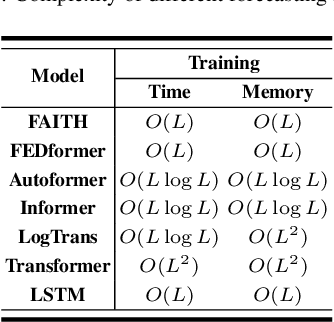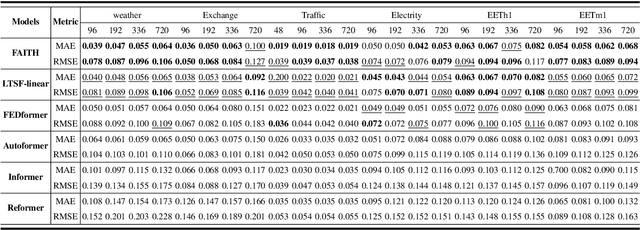Quangao Liu
WindowMixer: Intra-Window and Inter-Window Modeling for Time Series Forecasting
Jun 14, 2024Abstract:Time series forecasting (TSF) is crucial in fields like economic forecasting, weather prediction, traffic flow analysis, and public health surveillance. Real-world time series data often include noise, outliers, and missing values, making accurate forecasting challenging. Traditional methods model point-to-point relationships, which limits their ability to capture complex temporal patterns and increases their susceptibility to noise.To address these issues, we introduce the WindowMixer model, built on an all-MLP framework. WindowMixer leverages the continuous nature of time series by examining temporal variations from a window-based perspective. It decomposes time series into trend and seasonal components, handling them individually. For trends, a fully connected (FC) layer makes predictions. For seasonal components, time windows are projected to produce window tokens, processed by Intra-Window-Mixer and Inter-Window-Mixer modules. The Intra-Window-Mixer models relationships within each window, while the Inter-Window-Mixer models relationships between windows. This approach captures intricate patterns and long-range dependencies in the data.Experiments show WindowMixer consistently outperforms existing methods in both long-term and short-term forecasting tasks.
Tokenize features, enhancing tables: the FT-TABPFN model for tabular classification
Jun 11, 2024Abstract:Traditional methods for tabular classification usually rely on supervised learning from scratch, which requires extensive training data to determine model parameters. However, a novel approach called Prior-Data Fitted Networks (TabPFN) has changed this paradigm. TabPFN uses a 12-layer transformer trained on large synthetic datasets to learn universal tabular representations. This method enables fast and accurate predictions on new tasks with a single forward pass and no need for additional training. Although TabPFN has been successful on small datasets, it generally shows weaker performance when dealing with categorical features. To overcome this limitation, we propose FT-TabPFN, which is an enhanced version of TabPFN that includes a novel Feature Tokenization layer to better handle classification features. By fine-tuning it for downstream tasks, FT-TabPFN not only expands the functionality of the original model but also significantly improves its applicability and accuracy in tabular classification. Our full source code is available for community use and development.
FAITH: Frequency-domain Attention In Two Horizons for Time Series Forecasting
May 22, 2024



Abstract:Time Series Forecasting plays a crucial role in various fields such as industrial equipment maintenance, meteorology, energy consumption, traffic flow and financial investment. However, despite their considerable advantages over traditional statistical approaches, current deep learning-based predictive models often exhibit a significant deviation between their forecasting outcomes and the ground truth. This discrepancy is largely due to an insufficient emphasis on extracting the sequence's latent information, particularly its global information within the frequency domain and the relationship between different variables. To address this issue, we propose a novel model Frequency-domain Attention In Two Horizons, which decomposes time series into trend and seasonal components using a multi-scale sequence adaptive decomposition and fusion architecture, and processes them separately. FAITH utilizes Frequency Channel feature Extraction Module and Frequency Temporal feature Extraction Module to capture inter-channel relationships and temporal global information in the sequence, significantly improving its ability to handle long-term dependencies and complex patterns. Furthermore, FAITH achieves theoretically linear complexity by modifying the time-frequency domain transformation method, effectively reducing computational costs. Extensive experiments on 6 benchmarks for long-term forecasting and 3 benchmarks for short-term forecasting demonstrate that FAITH outperforms existing models in many fields, such as electricity, weather and traffic, proving its effectiveness and superiority both in long-term and short-term time series forecasting tasks. Our codes and data are available at https://github.com/LRQ577/FAITH.
 Add to Chrome
Add to Chrome Add to Firefox
Add to Firefox Add to Edge
Add to Edge